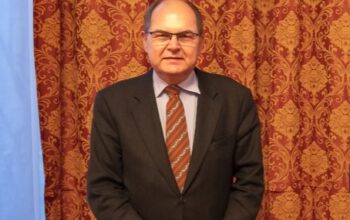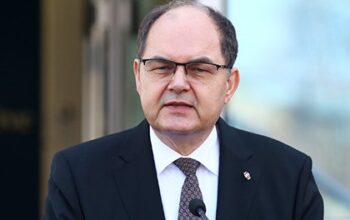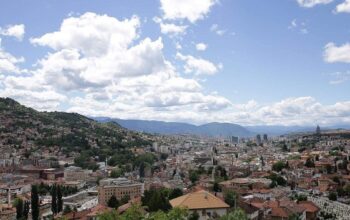On Sunday 22 April 2012, several thousand people of different faiths, ages, nationalities and backgrounds convened at the Donja Gradina Memorial Site along the Sava River in Bosnia & Herzegovina. This international and multiethnic gathering was organized by the Government of Republika Srpska to commemorate the hundreds of thousands of individuals who perished at the hands of the genocidal Ustaše regime of the Independent State of Croatia during the Second World War. While the attendees had assembled to ensure the continued remembrance of a very sad past, the event itself was perhaps more indicative of a hopeful and peaceful future.
In addition to RS officials including President Milorad Dodik, RS National Assembly President Igor Radojicić, and Minister of Economic Relations and Regional Cooperation Željka Cvijanović (whose Ministry organized the ceremony), the international representatives present included the Prime Minister of Serbia, the Ambassadors to BiH of Russia, Germany, and Italy, the Israeli Minister of Tourism along with other Israeli officials, the United Kingdom’s Defense Attaché, the Head of the Banja Luka Branch Office of the United States Embassy, and leaders of the Serbian Orthodox, Roma, and Jewish communities. Other communities including the BiH military, and the American Jewish Community—represented by Prof. Richard Stone and Malcolm Hoenlein, the Chairman and CEO of the Confederation of Presidents of Major Jewish Organizations in the US—further enriched the procee1dings with their presence and participation.
Importantly, the event paid tribute, not only to the Serbs, Jews, and Roma who were exterminated at Donja Gradina, Jacenovac, and the other Ustaše death camps, but to the many thousands of anti-fascists who were also executed regardless of their religious background. Indeed, RS President Dodik warned those present to be careful not to condemn all Croats for the sins of the Ustaše. Some of the remarks through the day expressed the pain and outrage not just for what happened nearly seven decades ago, but for how much those events have been forgotten and diminished throughout the world. But the overarching tone of the day was focused on moving forward without erasing the past. The very presence of so many representatives from Europe and beyond provided an indication that Republika Srpska and Bosnia & Herzegovina truly are reentering the international community.
After a wreath laying ceremony that highlighted the numerous international and domestic delegations that had travelled to the eerily beautiful woods in Kozarac Dubica to pay their respects, a multi-faith service paid tribute to the suffering that had occurred there. Speeches in different languages highlighted themes of remembrance, cooperation, and hope for the future. Amid the vibrant new growth in the vernal wood, the cauldrons in which human remains were burned in order to make soap provided a sobering reminder that those very trees grow from the ashes of both the buildings and bodies that were burned or buried in an attempt to first eradicate the various targeted populations and then erase the evidence of that barbarism. Consequently, a cornerstone was also laid that day to begin construction on a museum aimed at recording the tragedy of the past and ensuring that it is never forgotten.
While discussions of “war in the Balkans” or “Balkan/Bosnian genocide” often focus on the 1992-1995 conflict which arose out of the dissolution of Yugoslavia, this event at Donja Gradina exposed the reality that the region has never really had the chance to recover from what transpired prior to the Cold War and the rule of communism. Vitriolic political language calls the RS an Entity “founded on genocide,” and tremendous international support is given to the Bosniaks who were killed in Srebrenica. While the world should mourn the loss of all those who were senselessly killed in the 1990s, few in the international community seem to even be aware of what transpired in the Balkans prior to the last twenty years and are consequently insensitive to the wounded memories which still color perspectives today. Understanding even the last century alone provides greater insight into the tensions that plague the region. The presence of so many international officials at Donja Gradina on 22 April 2012 indicates that the focus on the Balkans is beginning to expand beyond the story lines that have dominated the last two decades. Only when all actors in Bosnia & Herzegovina are prepared to look beyond the good versus bad dichotomies of the past can they transcend those narratives and allow the country, its Entities and its people to meet their full and vast potential.


